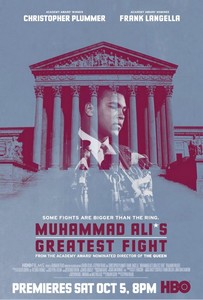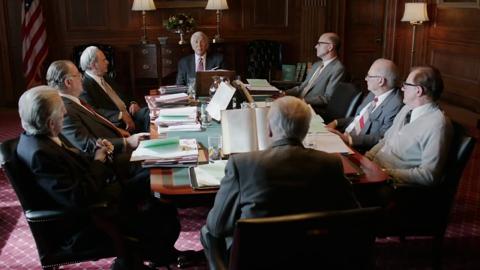
The most successful world heavyweight boxing champion of all time faces his biggest challenger — the United States government — in the HBO film Muhammad Ali’s Greatest Fight.
In late February of 1964, a brash and recently unimpressive young boxer predicted — quite emphatically — that he was going to not only beat the current rock of a heavyweight champion, Sonny Liston, but decimate him to gain the title. The odds were against him at 7-1, but on that fateful night, Cassius Clay proved all the pundits wrong. Soon after the victory, Clay announced that he’d joined the Nation of Islam and that, hereafter, he’d be known as Muhammad Ali.
His gruff, bloviating demeanor, at a time when blacks were expected to remain humble, left Ali with very few fans in those early years. Then, in 1967, in the midst of the Vietnam War, his license to box was revoked over his refusal to be drafted on religious grounds. That decision would reverberate through the legal system for more than three years before finally waging its own battle all the way to the Supreme Court. Once again, everyone considered Ali a heavy underdog to win his freedom from a five-year jail sentence and a $10,000 fine.
The film is a behind-the-scenes docudrama of the inner workings of the Supreme Court and how this case came to be heard and ultimately decided.
Director Stephen Frears (The Queen, High Fidelity, Dangerous Liaisons) crafts a fascinating story into the most intimate details of the justices and their staffs. Its effectiveness is so complete that the viewer gets a sense of violating the privacy of those involved.
The ensemble cast — heavy on seniors, given that the Supreme Court’s average age at the time was 71 — provide nearly universal sterling performances. Frank Langella leads the court as self-interested old-school conservative Chief Justice Warren Burger. His most trusted ally on the court is the very nearsighted but morally-centered Justice John Harlan (Christopher Plummer). The rest of the court includes Justice William Brennan (Peter Gerety), Justice William Douglas (Harris Yulin), Justice Hugo Black (Fritz Weaver), Justice Potter Stewart (Barry Levinson), Justice Thurgood Marshall (Danny Glover), Justice Harry Blackmun (Ed Begley Jr.) and Justice Byron White (John Bedford Lloyd).

Ali’s fate would be decided by justices from a generation that seemed out of touch with the turmoil taking place just outside their window and, more often, within their very chambers. A key player in translating the divide was Justice Harlan’s newly hired clerk, Kevin Connelly (Benjamin Walker), who would take the biggest risk of his young career to speak up for Ali’s plight in hopes of converting the prevailing minds of the court.
However, one of the biggest stars of the film is Ali himself. Frears presents him as is via archival footage that’s flawlessly interweaved throughout the film, driving home the power, emotion and sincerity of this unparalleled celebrity.
Only rarely does the film stray off the mark. There are, for example, a few lines of dialogue that seem unlikely in the day and spoken with a sly wink to today’s understanding of the time. We also don’t get a full understanding of the one man on the court who seemed most likely to play a key role as the only black member of the court — Justice Marshall.
Frears’s film gives us a probing, intelligent, introspective understanding of one of the most important cases to come before the Supreme Court and delivers it with every bit the deftness of an Ali jab.


